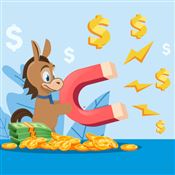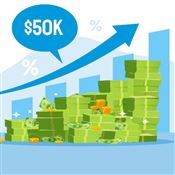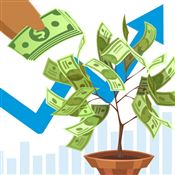High Yield Alternative Investments
Stocks and funds are the typical choices for investment, but are there other high-yield alternatives? Read on to find out.
 |
Here are the 13 best alternative investments with high returns:
High-yield alternative investments are a good addition to your portfolio. They can offset your portfolio losses in times of economic downturn.
In this guide, learn some of the best high-yield alternative investments, including the platforms you can use to access them.
Invest in Real Estate with $10+
- Only $10 minimum investment
- Get a diversified portfolio of real estate projects across the US
- Open to all investors
Online Alternative Investments
- Exclusive access to private market investments
- Wide range of alternative investments like art, real estate, legal financing, and more
- Goal-based investing for growth or income
- Minimums starting from $10,000
13 Best High-Yield Alternative Investments
The high-yield alternative investments below are accessible to all types of investors. You don't need a great amount of capital to be able to invest in most of these.
Real Estate
Real estate is one of the most popular high-yield alternative investments. This is an ideal investment because the value of real estate normally appreciates over time.
According to the Federal Housing Finance Agency, the annual average home price increase since 2000 has been 4.7%, and since 2023, the average rate has been 5.7%.[1]
You can invest in residential property, commercial property, land, or private and public REITs.
The only downside is that most real estate properties have prices that can be too high to invest in. Good thing, there are real estate investing platforms such as Fundrise, YieldStreet, and Arrived.
These platforms allow you to invest in real estate assets whenever and wherever you are. You don't need a huge down payment and you also don't need to manage the property.
|
|
Private Equity
Investing in private equity means buying shares of private companies or companies that are not publicly traded.
This may involve buying private stocks of a mature business or providing the first financial investments to a startup. The latter is called angel investing.
With this, your investment is not affected by fluctuations in the stock market. It is only dependent on the performance of the company you invested in. However, this investment is less liquid compared to investing in public companies.
Yieldstreet and StartEngine (formerly SeedInvest) are some platforms offering access to private equity investments.
|
|
Precious Metals
Precious metals such as gold hold their value well when inflation is high. It also acts as a hedge during periods of economic uncertainty. Precious metals include gold, silver, platinum, etc.
If you want to invest in precious metals, you can do so by investing in ETFs or bullions. Bullions are normally stored in bars.
If you want to test this out, you can start with buying silver, as this is cheaper than gold.
Platforms that offer physical precious metal products include JM Bullion and SD Bullion.
|
|
Commodities
Commodities normally include crops, oil, and precious metals. Investing in commodities doesn't necessarily mean you'll buy the physical asset and store it in your house. Commodities investors normally invest digitally.
Investing in commodities is not for the short-term investor as commodity prices tend to be volatile in the short term. However, commodities serve as good inflation hedges in the long term.
There are platforms where you can buy or sell commodities at set prices. In doing this, you take part in ensuring that the supply meets the demand. You can either buy mutual funds or ETFs.
Browse through platforms like IBKR Mutual Fund Marketplace if you want to invest in commodity-focused funds.
|
|
Art
Art is another ideal high-yield alternative investment because its intrinsic value also appreciates over time.
But since this is a tangible asset, you will have to prepare for the associated cost of storing and preserving the artwork.
If you don't feel like storing art pieces, investing in art platforms such as Masterworks may interest you. Masterworks allows you to own a part of famous art pieces through fractional ownership.
Public also offers fractionalized art, although there aren't as many artworks to choose from compared to Masterworks.[2]
|
|
Fine Wine and Rare Whisky
The finest wines and rarest whiskies are luxury assets that can serve as good alternatives to securities. At Vinovest, you can invest in fine wine and whisky starting at $1,000.[3]
Indices tracking the 1,000 most sought-after fine wines and whisky give you a general idea of how profitable these assets are. Since its inception, the fine wine index has seen a 314.6% gain over 20 years,[4] while the rare whisky index rose 384.24% since 2013.[5]
To earn money with fine wine and whisky, investors use a buy-and-hold strategy. They buy a wine or whisky, hold it, and sell it once its value increases due to rarity or the aging process.
|
|
Lending
Lending is a popular alternative investment that can come in various forms. One of the most common is peer-to-peer (P2P) lending. With P2P lending, you get to lend money to borrowers through online lending platforms such as Prosper.
Prosper is a P2P lending marketplace where you can invest in loans starting at $25. It has an average historical return of 5.5% and loan terms range from 2 to 5 years.
|
|
Private Mortgages
Investing in private mortgages offers a unique avenue for real estate investment without directly acquiring a property. In this scenario, you assume the role of a lender, extending funds to homeowners.
Your investment represents the mortgage's debt amount, and you earn profits through interest payments. The property itself acts as collateral, providing security in case the homeowner stops making payments. When this happens, you can assume ownership of the property.
Paperstac serves as a convenient online marketplace, connecting individual investors and facilitating the trading of mortgage notes. You can explore listings from various locations across the United States to discover potential investment opportunities.
There's also Percent, which is a private credit investing platform. It offers various credit-based notes, including mortgage-backed ones. In 2023, it reported a weighted average APY of 18.83%.[6]
|
|
Farmland
Diving into a farmland investment is like a specialized branch within the broader realm of real estate. The returns from farmland investments have consistently risen since 1990, with an almost 20x growth for those who invested back then.[7]
Beyond financial gains, investing in farmland means actively supporting crop production and sustainable agriculture. Notably, billionaire investors are drawn to farmland due to its relatively untapped potential.
You can explore opportunities in farmland investment through online platforms like AcreTrader and FarmTogether. These platforms can connect you with diverse farmland properties across the United States.
|
|
Collectibles
Collectors buy items they deem valuable and hold onto them for a long time. Eventually, rarity and cultural value drive their prices up, making them an ideal investment. Examples of collectibles include sports memorabilia, trading cards, toys, and comics.
Platforms such as Collectable, Rally, and Public make it easier for you to invest in these collectibles. While you can perfectly invest in the physical item itself, you also have an option to just buy shares for partial ownership, starting at $5, or even $1 sometimes.
Basically, this means that "a company" is specifically created to hold one unique item and the shares of that company are then sold to investors. This way, you gain partial ownership of a collectible through fractionalization.
|
|
Crowdfunding
Crowdfunding is a dynamic way for a community of backers to come together and fuel a range of ventures. It spans diverse assets like corporate debt, consumer debt, real estate, and private stocks.
At Groundfloor, investors crowdfund to issue real estate loans to borrowers in exchange for interest payments. As of October 2024, it has an average return of 10% and a minimum investment of $100[8].
Then, at RealtyMogul and EquityMultiple, you can invest with other investors to fund commercial real estate projects, among other things. RealtyMogul reports an overall realized IRR of 18.1%.
|
|
Royalties
Every time someone streams an artist's song, they earn royalties. Royalties might be commonly associated with music, but it also applies to book publishing, television, film, pharmacy, intellectual property, and energy.
As an investor, you don't need to be a creative or an artist to earn royalties. You can just buy the right to their royalty revenue through platforms like Royalty Exchange.
Artists sell their royalty revenue rights for a specific period of time to an investor in exchange for an upfront payment. Depending on the song or film you choose, you could earn enough royalties to break even in a few years.
|
|
Non-Fungible Tokens
Using blockchain, non-fungible tokens (NFTs) tokenize or represent digital ownership of an item whether that's art, music, collectibles, gaming merch, or even real estate.
Unlike regular cryptocurrency coins such as Bitcoin or Ethereum, each NFT digital asset is one of a kind. It's like having a unique piece of artwork - no copies allowed.
You can earn from NFTs in many ways, but the most common one is by flipping them. Purchase an NFT while it's still cheap, and then sell it when speculation drives its price up.
To buy NFTs, use NFT marketplaces such as Mintable, OpenSea, and Rarible. The investment returns for NFTs vary significantly. You can either lose all your money or see explosive gains.
|
|
What Is an Alternative Investment?
An alternative investment is any asset class outside of cash, publicly traded stocks, or bonds. ETFs and mutual funds also consist of publicly traded stocks and bonds, so they are not considered alternative investments. They are actually mainstream investments.
Most investors buy alternative assets for diversification, while others do so out of sheer interest in the sector. Alternative investments are attractive because they provide non-correlated returns that can complement your mainstream assets.
Just a heads-up though - some alternative investments have limited liquidity. That means you cannot convert it to cash as quickly as you can with stocks or funds.
Why Should You Invest in High-Yield Alternative Investments?
- Diversification
Alternative assets like real estate, fine art, and peer-to-peer lending have a low correlation with equities. So, it can be an ideal strategy to diversify your portfolio with these products. - Access to exclusive assets
Private equity, private credit, and venture capital investments are usually exclusive to institutional investors and high-net-worth individuals. Thanks to alternative investment platforms, you could also access these markets as an investor. - Increase portfolio returns
Some alternative investment offerings reported gains higher than the stock market's average returns.[9] So not only can these assets help diversify your portfolio, but they may also potentially enhance your overall returns as well.
Pros and Cons of Alternative Investments
Here are some of the advantages and disadvantages of diving into alternative investments:
Pros:
- Offers diversification benefits
- Can offer protection against inflation
- Helps reduce portfolio volatility
- Low correlation to stock market performance
Cons:
- Limited accessibility
- Has higher risks than mainstream investments
- Has higher fees or transaction costs
- Some are not easily convertible to cash
How Do Alternative Investments Fit Into a Portfolio?
Deciding how much of your portfolio should be in alternative investments really depends on your financial goals, risk tolerance, and how long you plan to invest. Some experts throw around this 40/30/30 idea - 40% in stocks, 30% in bonds, and another 30% in alternative investments.[10]
If you're all about long-term investing and can handle some risk, then investing in private equity, art, or lending can take a larger percentage of your asset allocation.
The allocation is also subject to your preferences and needs. So if you prefer assets with high liquidity (those that can be easily sold on short notice), then you can allocate more for commodities.
Yes, alternative investments tend to be high-risk, which is why they are usually limited to accredited investors. These alternative investments are typically complex, illiquid, and costly due to high fees. The minimum investment can also be high, so you're risking more money on a single position.
Regulation of Alternative Investments
Even though the SEC keeps an eye on alternative investment vehicles, here's the kicker - their securities don't have to go through the whole registration process. It's like they get a bit of a shortcut in the regulatory journey.
The rules for alternative investments are a bit fuzzier compared to the clear guidelines for mainstream securities. That's why investors really need to dig deep and do their homework when considering alternative investments.
Bottom Line
In the realm of investing, the important factor for minimizing risk and maximizing returns is diversification. Embracing alternative investments offers distinct chances to broaden your portfolios and potentially achieve lucrative returns.
Real estate, private equity, precious metals, commodities, and art are some of the best high-yield alternative investments. Don't forget, though, that these assets also come with risks, such as illiquidity and fluctuations in value.
Make sure you have done your research before investing in any asset.
References
- ^ Federal Housing Finance Agency. FHFA House Price Index (HPI) Monthly Report, Retrieved 03/15/2024
- ^ Public. Fine Art, Retrieved 10/02/2024
- ^ Vinovest. What is the minimum amount that I can deposit at one time?, Retrieved 10/05/2024
- ^ Liv-Ex. Liv-ex Fine Wine 1000 turns 20, up 300% since its inception, Retrieved 10/05/2024
- ^ Rare Whisky. RW Apex 1000, Retrieved 10/05/2024
- ^ Percent. 2023 at Percent: Resilience to Revolution in Private Credit, Retrieved 10/02/2024
- ^ AcreTrader. U.S. Farmland Returns, Retrieved 03/14/2024
- ^ Groundfloor. Build Your Wealth With Groundfloor, Retrieved 10/22/2024
- ^ Arrived. Historic Returns From Investing In Rental Homes, Retrieved 10/02/2024
- ^ Wealth Management. The Case for the 40/30/30 Portfolio, Retrieved 01/08/2024
Write to Del Exconde at feedback@creditdonkey.com. Follow us on Twitter and Facebook for our latest posts.
Note: This website is made possible through financial relationships with some of the products and services mentioned on this site. We may receive compensation if you shop through links in our content. You do not have to use our links, but you help support CreditDonkey if you do.
Fundrise, LLC ("Fundrise") compensates CreditDonkey Inc for new leads. CreditDonkey Inc is not an investment client of Fundrise.
|
|
| ||||||
|
|
|










